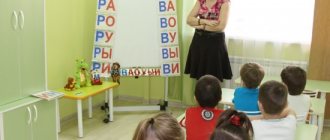For a small child, the world of sounds and coherent speech is very complex, so adults should help him in every possible way in the development of speech. But sometimes children do not master pronunciation, and their speech becomes incoherent and incomprehensible. This disrupts not only communication with the child, but also his further education, upbringing and development. Even if he does not have general developmental disorders, such a child will experience serious difficulties in learning, as well as psychological difficulties in communicating with peers and teaching staff. The feeling of one's own imperfection can lead to problems in the socialization and adaptation of children with speech defects, cause isolation, and in the future lead to even more serious complications in life. To prevent this from happening, the activities of a professional speech therapist and speech therapy work carried out by a kindergarten teacher are of great importance.
Their responsibilities are different. A speech therapist is a professional who sets the direction of activity, assigns pronunciation to children, develops and trains the speech apparatus so that the child can pronounce sounds that were previously absent in his speech or those that he pronounced with errors. The work of a teacher in the speech therapy group of a kindergarten, in general terms, is to support the work of the speech therapist, consolidate the acquired knowledge and skills in children, help them master complex sounds, and do this not from time to time, but on an ongoing basis. This means that the central place in the work on correcting speech disorders belongs to a speech therapist, and the teacher supports his activities in every possible way and helps children learn new knowledge and skills more easily and quickly.
The experience of working as a speech therapy group teacher is of great importance for children. A good specialist knows the specifics of his work very well, knows how to get along with children with special needs, cooperates competently with a speech therapist and helps students correct existing speech disorders faster and more productively.
Key responsibilities of a teacher
When working with children with speech disorders, the teacher is obliged to take measures to increase the vocabulary of preschoolers, eliminate agrammatisms, deficiencies in phoneme formation and incorrect pronunciation. Therefore, such pedagogical activities have unique features. Taking them into account, teachers and doctors effectively eliminate speech deficiencies, help children learn and integrate into society.
The key to success is coordinated correctional work in speech therapy groups. The teacher must examine each child immediately after joining the team and carefully study the medical recommendations. A thematic annual work plan is jointly drawn up, taking into account the age, knowledge and capabilities of the children.
A speech therapist corrects and improves speech communication. The responsibilities of the teacher include:
- control of children’s speech during classes and rest for effective mastery of it;
- performing speech therapy exercises, explaining them to parents - so that children expand their vocabulary and actively use it, reinforce correct sound pronunciation, develop fine and articulatory motor skills;
- conducting classes and organizing leisure time, taking into account parallel and individualized education for children;
- creation of psychologically comfortable conditions in the group for better speech formation and elimination of speech dysfunction in students.
Difficulties of working as a speech therapy group teacher
In order to most effectively plan and apply correctional work in the field of speech pathology in children, the teacher must understand the features of psychological processes associated with speech disorders:
- Problems with memory, attention, and the ability to concentrate on solving a specific problem.
- Disorders of articulatory and finger motor skills.
- Incomplete formation of verbal and logical thinking.
Since children with speech pathologies also have other deviations or developmental delays, this may manifest itself as follows:
- Students cannot reproduce the order of objects if they are rearranged. Sometimes children cannot cope with the sequence of arrangement of even 3-4 objects.
- Unable to find inconsistencies in paired drawings.
- Items that need to be sorted according to a certain criterion are not fully identified, for example, putting aside things made of wood, paper, fabric, and so on.
Such children are disinhibited, they cannot concentrate on one action or object for more than a few minutes, and they get tired very quickly, so a teacher in a group for students with speech disorders will need to visually reinforce their actions. He will also have to use simpler speech structures, explain his actions as briefly and clearly as possible for children of the appropriate age and level of knowledge, and give them rest between exercises. Children with such features remember everything much more easily at an involuntary level than at a voluntary level, so all activities need to be structured in a light playful way in order to interest children in what is happening.
Problems with articulatory motor skills are manifested in the physical limitation of movements of parts of the speech apparatus: tongue, lips, soft palate, lower jaw, therefore, on the advice of a speech therapist, classes on the development of these parts of the body in the form of special speech gymnastics should be included in the work hours of the teacher in the speech therapy group.
Speech disorders are often combined with other developmental problems, for example, they are associated with underdevelopment of fine motor skills. That is why experienced specialists insist that the development of motor skills be stimulated in every possible way in children with similar problems. Such children have constrained movements, do not know how to lace their own shoes or fasten the buttons on their own clothes, hold cutlery not with their fingers, but clasp it in their fist, and also take other utensils, for example, they cannot use drawing brushes, pencils and felt-tip pens correctly.
Pupils with speech underdevelopment have indicators of general development below their age norm. The difference is not too noticeable, but it will worsen as children grow older, unless correct and systematic correction is applied. In order for a child to develop correctly, he definitely needs to develop speech and correct all its violations. To do this, the teacher will have to demonstrate not only his educational abilities and professional knowledge, but also purely human positive qualities.
In speech therapy groups there are children with different behavior and psychological characteristics. Some of them quickly become distracted, begin to get bored, not pay attention to what is happening, fidget, or sit apathetically in a corner. Others show signs of irritation and aggression and react painfully to the teacher’s comments. So, in order to find an individual approach to each child, the teacher will take a lot of effort, time and patience, and will need all possible tolerance and endurance. To work with such groups, you need to really love children and care about their well-being.
The working week according to the work schedule of a speech therapy group teacher, due to the high workload on the employee, is a total of 25 hours, that is, 5 hours a day for a five-day week. If the teacher overworks, his rate is recalculated and an additional 20% is paid for working with the speech therapy group.
Effective speech development
When working, a teacher of speech therapy groups on the speech development of preschool children must use all types of communication - initiated by adults and spontaneous. You need to ask each child questions, not stop him when he wants to speak, and encourage initiative in conversation. In order for children to master speech faster, the teacher must:
- listen to children’s conversations and be able to identify deficiencies in phonetics and grammar in speech;
- engage in the education of pupils continuously, taking into account the lexical topics given by the speech therapist - in this case, the teacher’s speech should be intelligible, with expressive intonations and emphasized articulation;
- provide a cognitive base - study various topics with children so that children master the minimum vocabulary and learn everything they need for impressive and expressive speech;
- stimulate interest in the conversation, involve students in it, maintain a conversation not only in class, but also on walks, games, and during quiet rest.
A clear example of the specifics of a teacher’s work is the coordination of numerals with nouns. The speech therapist introduces the pupils to speech forms, and the teachers do exercises - how to use the adverbs “little” and “many” with numerals, how to use the genitive, accusative case, etc.
Article:
Children with speech development disorders should be provided with special conditions for education and training in preschool educational institutions.
Correct speech is one of the indicators of a preschooler’s readiness for school.
The search for effective techniques and methods of speech correction has not lost its relevance today.
The question of interaction between a speech therapist and a teacher in correctional work to overcome speech disorders in children is always relevant.
Like everything new, this entails certain difficulties. Sometimes it can be very difficult to coordinate the work of a speech therapist and a teacher, to clearly delimit the functions of each.
The work of a teacher in a speech therapy group has a number of features; it is fundamentally different from the work of a teacher in a mass group.
So, let's try to take a closer look at the stages of work of a speech therapist and teacher in a speech therapy group.
The first stage is diagnostic
Educator
Reports to the speech therapist the results of his observations of the child in various activities; the history of his early development and the conditions of family education;
Conducts diagnostics of general development;
The teacher of the speech therapy group must be well aware of the individual characteristics of children with speech impairments. The teacher’s attention should be especially paid to children who have a history of clearly defined neurological symptoms and are characterized by psychophysiological immaturity.
Speech therapist
Conducts an annual comprehensive speech therapy examination of children, the results of which are reflected in the speech card.
The second stage is correctional.
Educator
- Monitors children’s speech in all types of classes and during restricted moments;
- Deals with the development of articulation and fine motor skills;
-Carries out work on sound automation;
-Helps improve grammatical categories, develop phonemic hearing and syllabic structure of speech;
-Carries out the necessary work with parents to optimize the correction process.
Speech therapist
-conducts correctional classes on the formation of correct sound pronunciation and the development of lexical and grammatical categories and coherent speech;
-gives recommendations for planning lessons taking into account the lexical topics being studied in a given period.
Corrective work in the group is carried out under the guidance and control of a speech therapist, and the teacher is his active assistant. His dominant role in the entire pedagogical process is explained by the fact that he knows better the speech and psychological capabilities of children, the degree to which each person lags behind the age norm, and the dynamics of all correctional processes.
Let us dwell in more detail on the main sections of speech development in the interaction between the teacher and the speech therapist.
First of all, this is work on the formation of correct sound pronunciation.
The speech therapist corrects speech disorders, and the teacher actively participates in correctional work.
Educator
Preparatory stage
Carrying out articulation gymnastics. Clarification of the movements of the organs of the articulatory apparatus.
The teacher, on the instructions of the speech therapist, reinforces the material worked out by the speech therapist in the children. Picture material is needed for articulation gymnastics.
Speech therapist
Carrying out articulatory gymnastics, tongue massage. Practicing reference sounds to produce missing or distorted sounds.
Stage of appearance of sounds
Educator
Clarification and consolidation of sound using tables with sound characteristics parameters. Sound symbols are selected to reinforce onomatopoeia. The teacher reinforces the pronunciation of the sound and focuses attention on correct articulation.
Speech therapist
Staging sound using special techniques. Sequential audio automation.
Sound acquisition stage
Educator
Sound is automated in words, phrases, poems and free speech on the instructions of a speech therapist. The work of a teacher in developing sound pronunciation requires certain knowledge and skills: knowledge of the correct articulation of each defectively pronounced sound. The teacher in the group should have speech material on automating the corrected sounds.
Speech therapist
Automation of sound in words, phrases, poems and free speech through homework in a notebook.
Vocabulary work
Replenishment, clarification and activation of children's vocabulary is carried out not only during speech development classes, but also during all routine moments.
The teacher is with the children in a variety of settings: in the locker room, washroom, bedroom, corner of nature, play corner and other places where there is a wide visual base for the formation of vocabulary in children with OPD. Working with children throughout the day, the teacher has the opportunity to repeatedly activate and reinforce new words, without which their introduction into independent speech cannot occur.
Classes on lexical topics by the teacher and other specialists should precede classes by a speech therapist to create the necessary cognitive and motivational base for the formation of speech skills. For example, if the planned topic is “Wild Animals,” then the teacher conducts an educational lesson, modeling or drawing on the topic, didactic games, conversations, observations, and introduces children to works of fiction on this topic.
Lexical topics, a minimum vocabulary (subject, verb, dictionary of signs) are outlined together with the speech therapist. It is clarified with the speech therapist what types of sentences should prevail in the appropriate period, as well as the level of requirements for children’s independent speech.
An approximate division of the functions of a speech therapist and a teacher in the process of working on a lexical topic
Speech therapist
In group classes, he introduces children to each new lexical and grammatical category, identifying children with whom it is necessary to reinforce the material, and carry out work in individual speech therapy classes. Supervises the work of the teacher to expand, clarify and activate the vocabulary of preschoolers in the classroom and in their free time.
Speech therapist
Conducts classes on speech development, familiarization with the environment and with fiction, taking into account lexical topics.
Replenishes, clarifies and activates children's vocabulary during most routine moments. Systematically controls the grammatical correctness of children's speech throughout the entire time of communication with them.
In speech development classes, all types of work should be provided with visual material. Games and exercises that lack visual support should not be included in the program, especially at the initial stage of training. This is due to the speech difficulties of children, the peculiarities of their attention, perception and thinking. Naturally, a speech therapy group teacher has to prepare significantly more manuals than colleagues from mass groups.
Consolidation of children's speech skills in individual lessons on the instructions of a speech therapist is carried out by the teacher in the afternoon, immediately after naps. This is the so-called speech therapy hour. The teacher works individually with those children whose names the speech therapist wrote down in a special notebook for evening classes. This notebook is filled out daily. It is very important that during an individual lesson between a teacher and a child, all other children do not distract them, but are busy with quiet games. It is better to conduct classes with children in a specially equipped speech therapy corner, where there is a mirror in which the faces of the child and the teacher can be reflected. A file for correcting sound pronunciation is also kept here. When working with a child, the teacher must remember that pronunciation of all phonetic material from the notebook must occur with the obligatory emphasis of the sound being reinforced in the voice. The teacher should not miss a single phonetic or grammatical error in the child’s speech. All tasks should be familiar to the child. Evening classes include exercises to practice articulation exercises, automate sounds, develop phonemic awareness, and form lexical and grammatical categories. The number of children studying with a teacher in the evening does not exceed 5-6.
The third stage is preventive.
Educator
Educators must create the necessary subject environment that would contribute to the fullest possible disclosure of the pupils’ potential capabilities and prevent their difficulties in speech development;
The organization of a subject-based developmental environment, as well as increased attention to children with a high degree of risk of developing speech disorders, constitute the main content of the teacher’s activities within the framework of the preventive direction.
Speech therapist
The speech therapist monitors the compliance of the developmental environment not only with the age needs of the children, but also with the structure of the speech defect;
Gives recommendations to educators on enriching the subject environment.
The subject-development environment in a group room must meet special requirements. There should be a sufficient number of board games and lotto, various construction sets, mosaics, various subject and subject pictures. The group should have a speech corner with didactic games, card indexes, and manuals.
Carrying out speech therapist tasks
The most important part of a teacher’s work is reinforcing the skills that a speech therapist instills in children. To correct deviations, “five-minute speech therapy sessions,” games, and exercises are used. The format is chosen depending on the schedule of classes and other activities of the children.
“Five-minute lessons” are short, emotionally pleasing training sessions for children that correspond to the lexical topic that the speech therapist has planned to study. They help develop all components of speech and consolidate specific skills. After lunch, to fill the pauses, it is recommended to use game exercises, specially developed by a speech therapist.
Before lunch and after bedtime, it is necessary to pay individual attention to each child. It is important to organize work in parallel - one student, for example, studies personally, while others rest under the supervision of a junior specialist. 10-15 minutes are allotted for individual exercises with the child. These classes are regularly attended by a speech therapist to monitor the results and make corrections if necessary.
To consolidate the acquired speech skill, the teacher offers children articulation gymnastics and gives them speech therapy exercises for:
- coordination of movements with speech;
- consolidation and differentiation of correctly pronounced sounds;
- staging speech breathing;
- development of the ability to remember, attentiveness, phonemic hearing, fine motor skills;
- developing the skill of writing descriptions (using mnemonic tables).
Creating a motivating atmosphere in the group
In order for children to believe in themselves and their capabilities, the atmosphere in the group should be as friendly as possible. The duty of the teacher is to eliminate negative emotions associated with speech dysfunction, to develop motivation for work and interest in work in each child. To create the correct psychological “background” you need:
- develop behavioral skills in children in a preschool group;
- notice and respond in a timely manner to manifestations of aggression, passivity, and conflicts;
- develop in children normal ethical and moral ideas about life and interaction with people;
- encourage initiative and good behavior.
You can obtain the profession of a teacher working with children with speech therapy disorders at the ANPOO "NSPK". For admission you do not need to pass the Unified State Exam, there are no entrance exams. Training is conducted remotely*, under an official educational license. The graduate will receive two diplomas at once - about secondary vocational education and professional retraining - and his value in the labor market will be high. Information about admission and promotions for applicants can be obtained from the admissions committee of the ANPOO "NSPK".
* Form of study – correspondence. Educational programs are implemented using e-learning and distance learning technologies.




